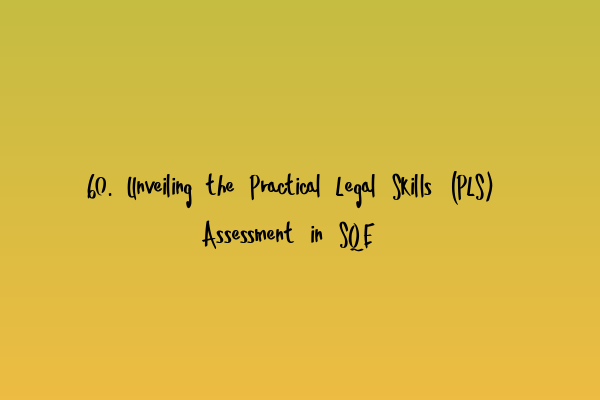Unveiling the Practical Legal Skills (PLS) Assessment in SQE
Aspiring solicitors preparing to take the Solicitors Qualifying Examination (SQE) are likely familiar with the various assessments they will face during the examination process. One important assessment that deserves attention is the Practical Legal Skills (PLS) assessment.
The PLS assessment is designed to evaluate a candidate’s practical skills in the context of the practice of law. It aims to test the application of legal knowledge and demonstrate the ability to perform tasks that are essential for a solicitor’s day-to-day practice. In this blog post, we will take an in-depth look at the PLS assessment and provide valuable insights to help you prepare for this crucial part of the SQE.
Understanding the PLS Assessment
The PLS assessment is divided into two parts: PLS1 and PLS2. Let’s explore each part in detail:
PLS1: Practical Legal Research
The PLS1 assessment focuses on the ability to conduct legal research effectively. It tests your skills in finding and analyzing relevant legal information to support your legal practice. This assessment will require you to demonstrate proficiency in using various legal research tools, such as online databases, case law resources, legislation databases, and academic journals. You will be asked to answer questions and solve problems based on a given scenario, showcasing your ability to comprehend and apply legal principles.
To excel in the PLS1 assessment, it is crucial to develop strong research skills. Familiarize yourself with different research methodologies and tools commonly used in the legal field. Practice analyzing and synthesizing legal information to form coherent arguments and solutions. Keep in mind that time management is crucial during this assessment, so mastering efficient research techniques will be beneficial.
If you want to dive deeper into effective research strategies, check out our article on SQE Strategies: Proven Tactics to Ace the Solicitors Qualifying Examination.
PLS2: Practical Legal Writing
The PLS2 assessment evaluates your skills in practical legal writing. It focuses on your ability to effectively communicate legal information through written documents such as letters, memos, advice notes, and other legal correspondence. This assessment will require you to draft a piece of writing based on a given scenario, demonstrating your understanding of legal concepts, clarity of expression, and attention to detail.
Developing strong writing skills is crucial for success in the PLS2 assessment. Practice writing legal documents using clear and concise language, paying attention to grammar, structure, and formatting. Familiarize yourself with common legal writing conventions and learn how to effectively communicate complex legal ideas in a simple and understandable manner.
If you are looking for guidance on applying legal concepts in real-life scenarios, our article on SQE Case Studies: Applying Knowledge in Real-Life Scenarios can provide valuable insights.
Tips for Success in the PLS Assessment
Preparing for the PLS assessment requires a strategic approach. Here are some tips to help you succeed:
1. Understand the Assessment Criteria
Gain a clear understanding of what the assessors are looking for. Familiarize yourself with the assessment criteria and ensure that your responses meet the required standards. Pay attention to factors such as legal analysis, clarity of expression, logical structure, and professional presentation.
2. Practice Time Management
Time management is a crucial skill when it comes to the PLS assessment. Develop strategies to effectively allocate your time during the research and writing process. Practice working under timed conditions to improve your ability to complete tasks within the given time constraints.
For more tips on time management in the context of the SQE, our article on Mastering Time Management in SQE: Strategies for Efficient Exam Completion will be valuable.
3. Seek Feedback and Improvement
Take advantage of feedback opportunities to enhance your skills. Ask your mentors, tutors, or study partners to review your practice answers and provide constructive criticism. Use this feedback to identify areas for improvement and refine your approach.
4. Keep Practicing
Consistent practice is key to success in the PLS assessment. Continuously challenge yourself with practice scenarios and exercises to sharpen your research and writing skills. The more you practice, the more comfortable you will be in applying legal principles and presenting your ideas effectively.
The PLS Assessment: A Stepping Stone to Success
The Practical Legal Skills (PLS) assessment in the SQE is an important milestone on your journey to becoming a qualified solicitor. It not only tests your ability to apply legal knowledge in practical scenarios but also evaluates your research and writing skills, which are essential for success in the legal profession.
By understanding the PLS assessment and implementing effective preparation strategies, you can increase your chances of performing well and achieving your goal of becoming a solicitor.
If you’re interested in delving deeper into SQE exam strategies and planning for optimal performance, our article on SQE Exam Strategy: Planning and Executing for Optimal Performance will provide you with valuable insights.
Remember, the PLS assessment is an opportunity to showcase your practical legal skills and demonstrate your readiness for legal practice. Embrace the challenge, prepare diligently, and strive for success in the SQE!
